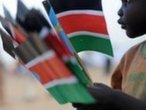 Voters in Sudan are going to the polls in the first multi-party elections in 24 years.
Voters in Sudan are going to the polls in the first multi-party elections in 24 years.Several politicians and parties opposed to President Omar al-Bashir are boycotting the polls amid accusations of vote-rigging.
Sixteen million people have registered for the presidential, parliamentary, regional and state elections.
The polls are being held as part of a peace deal which ended a civil war between the north and south of Sudan.
The National Elections Commission insists that the three-day polls will be free and fair.
Abel Alier, the chairman of the Elections Commission, was adamant that his organisation had not favoured the National Congress Party of President Omar al-Bashir.
"We are committed to free, fair polling," he said.
"We want to ensure that what we do will make it evident both to the voter, to the ordinary citizen, and to the world at large that this process of polling is going to be transparent."
Complex polls
The BBC's James Copnall, in the Sudanese capital Khartoum, says the Elections Commission has given a dizzying array of detail about the polls, from the number of polling stations being used to the number of helicopters required to transport electoral material around this vast country, to the procedures in place to ensure fair voting.
But he adds that the electoral body has not convinced the parties opposed to President Bashir.
President Bashir needs a democratic mandate since being indicted by the International Criminal Court for alleged war crimes in the western region ofDarfur, our correspondent says.
The polls are extremely complicated, and the authorities also have to deal with the terrible infrastructures of the south, and an ongoing low-level civil war in Darfur.
But many people are already looking beyond the elections to next January's referendum, when southerners will vote on possible independence, our correspondent says.



